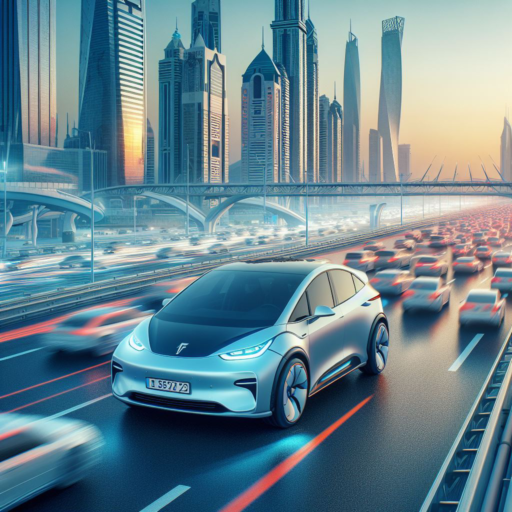
Advancements in Electric Cars in the UAE: A Comprehensive Overview
Electric cars have been gaining significant traction in recent years, and the United Arab Emirates (UAE) is no exception. With a strong focus on sustainability and reducing carbon emissions, the UAE has been making remarkable advancements in the electric vehicle (EV) industry. In this article, we will delve into the latest developments in electric cars in the UAE, including the growth of charging infrastructure, the cost of ownership, and the environmental impact of these vehicles.
The Rise of Charging Stations
One of the key factors driving the adoption of electric cars in the UAE is the establishment of a robust charging infrastructure. The government has been actively investing in the deployment of charging stations across the country to support the transition to sustainable transportation. According to the National Electric Vehicles Policy, the goal is to establish a national network of EV chargers throughout the UAE, catering to the needs of electric vehicle owners.
In Dubai, the government has implemented a policy to promote green mobility by setting yearly goals for electric or hybrid vehicle procurement. The Dubai Green Building Regulations and Specifications mandate that 5% of parking spaces should be dedicated to green or low emission vehicles. Additionally, the Dubai Building Code provides guidelines and requirements for electric vehicle charging points.
Abu Dhabi has also taken significant steps towards creating a comprehensive charging infrastructure. The Regulatory Policy for Electric Vehicle Charging Infrastructure in the Emirate of Abu Dhabi sets out stipulations and criteria for the establishment of charging stations. This policy represents a significant milestone in meeting the UAE’s target of achieving net-zero emissions by 2050.
The number of charging stations has been steadily increasing, providing electric car owners with convenient access to charging facilities. These investments in charging infrastructure have significantly contributed to the growth of the electric vehicle market in the UAE.
Cost of Ownership
While the initial purchase price of electric cars may be higher than their gasoline-powered counterparts, the cost of ownership over the vehicle’s lifespan can be significantly lower. Electric vehicles have fewer moving parts and require less maintenance compared to internal combustion engine vehicles. With fewer components to service, electric car owners can save on maintenance and repair costs.
Moreover, the cost of charging an electric vehicle is lower than the cost of fuelling a conventional car. Electricity prices in the UAE are affordable, making electric cars an economically viable option for many residents. In addition, the UAE government has been providing financial incentives to promote the adoption of electric vehicles, such as reduced registration fees and lower customs duties.
Another cost-saving aspect of electric cars is the potential for lower operating costs. The efficiency of electric motors allows for greater energy utilization, reducing the amount of energy wasted as heat. This increased efficiency translates to lower fuel costs and potentially lower overall energy consumption.
Environmental Impact
One of the primary motivations behind the push for electric vehicles is their reduced environmental impact. Electric cars produce zero tailpipe emissions, helping to improve air quality and reduce carbon emissions. As the transportation sector is a significant contributor to greenhouse gas emissions, the adoption of electric vehicles plays a crucial role in mitigating climate change.
The use of electric vehicles also presents an opportunity to integrate renewable energy sources into the charging infrastructure. Solar and wind power can be harnessed to charge electric cars, further reducing their carbon footprint. The UAE’s commitment to diversifying its energy mix, as outlined in the UAE 2050 Energy Goals, aligns with the increasing demand for sustainable mobility and the deployment of green energy charging infrastructure.
Furthermore, the reduced noise pollution generated by electric vehicles contributes to a more peaceful and sustainable urban environment. Electric cars operate silently, reducing the noise pollution that is often associated with traditional combustion engine vehicles.
Outlook
The future of electric cars in the UAE looks promising, with continued advancements in charging infrastructure, cost-effectiveness, and environmental sustainability. The government’s commitment to supporting the electric vehicle market, coupled with the increasing availability of charging stations, will drive further adoption of electric cars.
As technology continues to evolve, improvements in battery technology and charging infrastructure are expected. This will enhance the range and charging speed of electric vehicles, making them even more practical for everyday use. Additionally, advancements in autonomous driving technology may further revolutionize the transportation landscape in the UAE.
The UAE government has set ambitious targets, aiming for electric vehicles to comprise 50% of total vehicles on the country’s roads by 2050. This demonstrates the government’s commitment to sustainable transportation and reducing carbon emissions.
The UAE is making remarkable progress in the electric vehicle sector. The growth of charging infrastructure, the cost-effectiveness of electric cars, and their positive environmental impact are key factors contributing to their increasing popularity. With ongoing investments and support from the government, the UAE is well on its way to becoming a global leader in sustainable transportation.







[…] network has supplied about 31,674 megawatt hours of electricity to electric vehicles. This shows how more people are choosing eco-friendly transportation […]